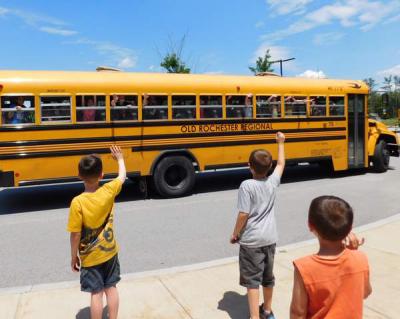Transportation costs create headache for ORR
Old Rochester Regional School District's budget has been burdened in recent years by a continuous shortfall in state funding for transportation costs, and now administrators, some state officials, and advocacy groups are saying it's time for the state to fulfill its obligation.
Passed in 1994 as an incentive for municipal school districts to regionalize, a Massachusetts law requires the state to reimburse regional school districts 100 percent of the cost of transporting students. The impetus behind the law was that regionalization would cut down on maintenance, transportation and education costs for smaller towns.
The reimbursement covers students in kindergarten through grade 12, provided that they live more than a mile-and-a-half from the school building they are attending.
But the state in recent years has paid hundreds of thousands of dollars less to regional districts than the promised 100 percent reimbursement. Last school year, only 73 percent of the total cost of Old Rochester's transportation was covered. The district received approximately $453,400 of the $617,400 it cost to transport students—a difference of approximately $164,000.
According to the Massachusetts Association of Regional Schools, which includes Old Rochester and regional districts such as Old Colony Regional Vocational School District and Freetown-Lakeville Regional School District, the last time regional districts' transportation was fully funded by the state was during the 2001-2002 school year.
Members of the Old Rochester School Committee, wrangling with budget challenges for the next fiscal year, have reached out to state officials over the past month, hoping to remedy the situation.
With the major funding sources for the district being contributions from each of the three towns (local assessments), Chapter 70 funding (the major source of state aid to public schools), and the state transportation aid, Old Rochester Regional Business Manager Patrick Spencer explained that the difference can truly impact the towns' and the district's budgets.
"When there is less revenues from any source of transportation or Chapter 70 aid, and programming remains the same, then the town assessments [will] be higher," he said, but with "limited resources in the three towns," it's more likely that the district budget will be reduced—and programming along with it—when expected aid doesn't come through.
While some might consider transportation a so-called cost of doing business for a regional district—as it is for districts that are not regionalized—regional district administrators and some state officials disagree.
Last October, State Auditor Suzanne Bump released a study on regional school system costs and expressed frustration with the state not living up to its promise.
“The statewide total for all types of transportation costs ... has been rising in recent years (approximately 10 percent between 2010 and 2016),” she said, noting that the increase includes the costs of special education and out-of-district transportation expenses.
It's a challenge ORR administrators know all too well. School districts are required by state law to provide an appropriate education for all special education students—including bearing the cost if students require transportation to and tuition for an out-of-district program. Additionally, districts pay tuition if a student chooses to attend a specialty high school, such as Bristol County Agricultural High School.
While those costs vary by year depending on students' needs, in years where transportation and tuition costs rise, administrators need to find creative ways to fund budgetary discrepancies.
The net effect of not funding transportation entirely, Bump stated in her study, is that some regional school districts are forced to cut programs that are critical to the quality of education provided to their students. “...these funding problems have a direct effect on the education options and attainments of regional district students at every grade level."
At Old Rochester, it’s a blow to the budget that is felt all over.
"There isn't a particular area that is hurt so to speak," Spencer said, "but in the past few budget cycles at ORR, there was not an opportunity to fund a new social worker at the high school nor a sign language teacher."
Purchases of new technological devices and Chromebook laptops were also limited, he said. As ORR is increasingly focusing on science, technology, engineering and math initiatives, the budget limitations may prove a hindrance. In December, ORR High School Principal Mike Devoll stated that he was attempting to increase student access to Chromebooks to train students in online test-taking, which the state is requiring for some standardized tests.
At the junior high, Principal Kevin Brogioli is hoping to expose all junior high students to computer science and coding by adding a class on the subjects to every students' schedule—but the initiative is budget dependent, he said in December, and will only be finalized if the school's budget can accommodate it.
Old Rochester School Committee members are encouraging residents to reach out to state officials to let them know that transportation funding is important to them.
Rep. Bill Straus is the state representative for all three towns. Mattapoisett's state senate representative is Sen. Mark Montigny, while Marion's is Sen. Marc Pacheco and Rochester's is Sen. Michael Rodrigues.
Rep. Straus can be reached at william.straus@mahouse.gov, or by phone at 617-722-2400. Sen. Montigny's email is mark.montigny@masenate.gov, and his office phone number is 508-984-1474. Sen. Pacheco can be reached at marc.pacheco@masenate.gov, or by phone at 508-822-3000. Sen. Rodrigues can be reached at michael.rodrigues@masenate.gov or by phone at 508-646-0650.
















